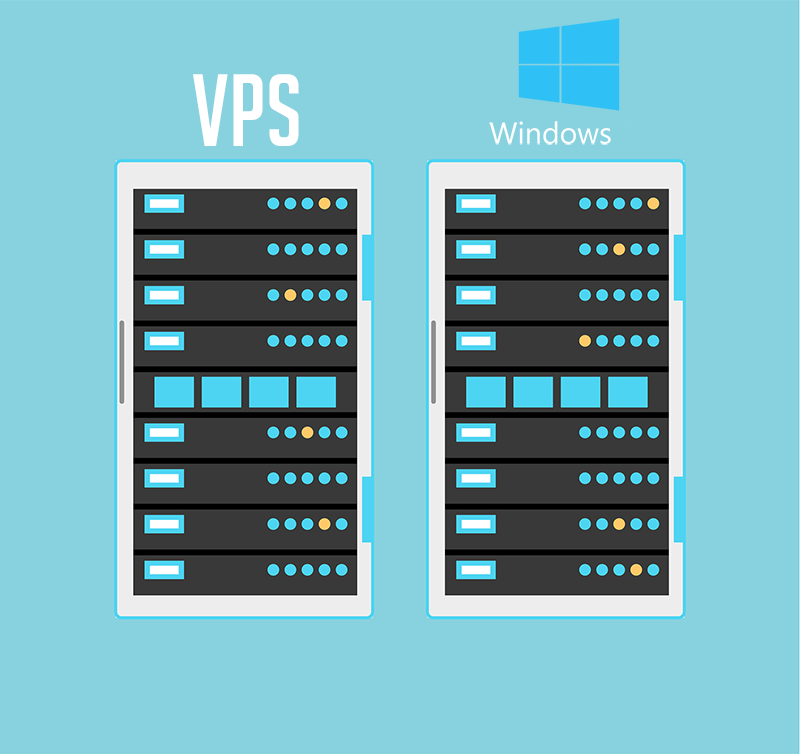What is Windows VPS?
If you have been using services on the internet for some time, you have probably heard of VPS Hosting . But if you are still not aware of this technology, we invite you to understand what exactly means a VPS Linux and a Windows VPS . First, this acronym stands for V irtual P rivate S erver (Virtual Private Server).
Windows VPS servers are used in applications that use languages:
- Classic ASP;
- ASP.NET;
- MSSQL (Microsoft SQL Server);
- MS Access (Microsoft Access);
- Visual Basic Development;
- Ç#.
The advantage of this type of hosting is that it allows access as an administrator profile (root) for those who hire it. It is a method of interconnecting a physical server, which is partitioned into several servers where each one acts as if it were a dedicated server. Each virtual server of this type has an operating system independent of the others that are also located within the same physical server and, when necessary, is administered completely independently.
The choice for a VPS hosting happens because many programmers and developers make frequent changes in their codes and also in the settings of the host itself, thus requiring privileged access, which is possible with the administrator profile.
Mostly the VPS is run on Linux or Windows. The Windows VPS is a solution to obtain about your hosting and will often be a kind of step to be taken after using a common hosting and before using a completely dedicated service.
When you are starting this type of research for which type of hosting to use, you will also come across shared hosting. But which one should you use?
Shared Hosting x VPS
The Windows VPS offers great advantages over shared hosting, among them is systemic scalability: you can upgrade your VPS resources at any time, increasing resources such as memory or hard disk, while in shared hosting the server is more limited and has all resources shared with other users.
In the case of VPS, both for Windows and for Linux, the resources are not shared with any other client, since you are the administrator and have total autonomy over the system and its resources. That way, you gain in performance and data security. This is not possible in shared hosting.
Why choose a Windows VPS?
The main advantage of a Windows VPS Server is its graphical interface that has the same “face” of the most used operating system in the world: Windows.
Ease of use
As we already mentioned, Windows is the most used operating system in Brazil and in the world. Therefore, most users are already more familiar with this system. This makes the Windows VPS a great option for its simplicity and familiarity of use since there is a great similarity between the use / interface of Windows Server with Windows Desktop.
Increased software compatibility
The Windows VPS has the most common operating system, as most software is designed to be used on your platform. Thanks to this popularity, the compatibility between the operating system and the software is better.
Very used server type on the market
Companies, freelancers and users in general generally have ease with the Windows system. This familiarity can make outsourcing the administration of your VPS cheaper. Likewise, even less experienced users can control a Windows VPS.
Windows VPS vs. Linux VPS
The main difference between the Windows VPS server and the Linux VPS server is that the two are platforms with very different operating systems. While Windows servers run a version of IIS (short for I nternet I nformation S ervices), Linux servers are usually configured with the server Hosting VPS and can run one of the many contributions that exist for this operating system.
It is worth mentioning that today Linux is the most widely used operating system in the world and found almost everywhere, from websites to Android devices, WiFi routers and even appliances. On the Windows system, they operate only on a technology exclusive to Microsoft, such as .NET . In Brazil, this system is very common as well.
If it is a website that does not use programming languages on the server and contains only HTML and CSS, for example, any of the platforms may be suitable for these languages.

What to consider before hiring a VPS?
- Look for a provider with easy access (communication), who has proven experience and customers already using the VPS server. Exchange ideas and see if they are serving other users as you would like to be served.
- Make sure your host’s VPS solution is flexible and allows for hardware customization. That way, you will be able to identify the different types of plans that exist on the market and choose the one that will best fit your requirements.
- Avoid hosts that only offer pre-formatted plans, as if you need future updates to the server it will not be possible, and it will only create problems to change hosts at a time when you have a large website. Each customer has different needs, such as better CPU speeds, greater storage capacity, bandwidth or RAM, you never know.
- Also check if the host you hire has an upgrade that is disconnected from the main plan. For example, if you only need more RAM, pay only for this upgrade. Thus, there is no need to change the entire main plan previously contracted.
Pros and Cons of using a VPS
Pros
- It basically works as a dedicated hosting, because despite sharing physical space with other hosting, it is virtually dedicated to your website. This makes it possible to better customize your website with fewer limitations, compared to shared hosting. Your system will never be overwhelmed by other sites.
- Costs are lower, as a single server structure is not required to serve only your site. Thus, you can build a website with growth potential and go on boosting your VPS along with the growth of your website.
- Dedicated ip with low price. So you can have optimized features with scripts and extensions running smoothly.
Cons
- Overselling : slowness caused by allocating more resources that the server can support. It is a not so common practice, but one that can occur – selling impossible-to-deliver wonders.
- Greater operational complexity: When assuming the task of being more flexible than a common website hosting, it can be complex to manage a VPS, especially if there is no simple manager to perform tasks and if the user is not familiar with programming. A well-known manager is cPanel.
- Greater capacity to receive visits than a common website hosting, but less than a dedicated one. Consequently, if it is overloaded with multiple sites it may not be able to handle what a dedicated server would normally handle.
How to connect to a Windows VPS?
Step 1 – Remote Desktop Connection
- When hiring a Windows Server, you can use Microsoft Remote Desktop technology to connect to your server.
- Run the application to connect the “Windows” and “R” keys to your server and, when a “Run” window appears, type “mstsc.exe” and click ok.
Step 2 – Wait for the application to load until the “Remote Desktop Connection” window appears:
- Enter the IP number of your virtual server (provided previously) and click ” Connect “.
Step 3 – After clicking on “ Connect ”, wait for the point at which your virtual server will ask for your access credentials (also provided previously in your welcome message).
- Enter the user . \ Administrator and the Password , ( . \ Administrator indicates a new connection).
Note: for Windows servers, usually the user provided is the “ administrator ” and the password is standard .
Important: change the password as soon as possible, as it is known.
Step 4 – Wait for the connection to be established and the remote desktop to appear.
- Note the number that will appear in the upper right of the screen . This will be your virtual identification. From now on, the operation of your virtual machine will in no way differ from a physical server.
Conclusion
Windows VPS is a great alternative for those who need a website hosting plan for their online business and should find a solution that meets their server needs.
There are now several plans for private servers and providers, choose the one that best fits your business proposal. On the Windows VPS, it is highly flexible, inexpensive and responds to a wide variety of uses and applications on the market.



